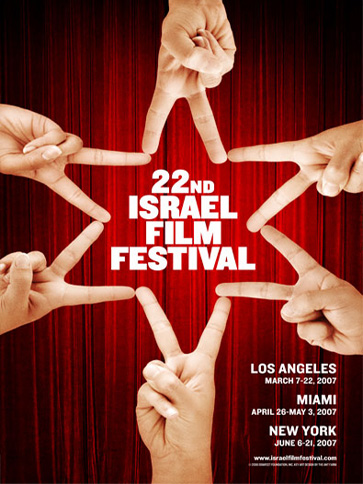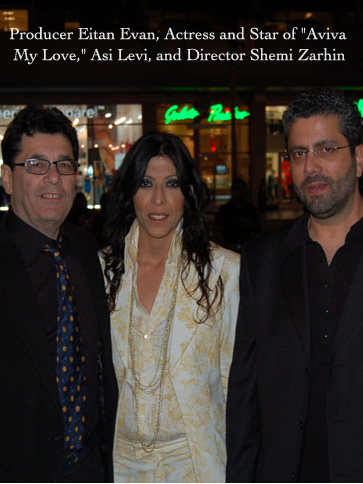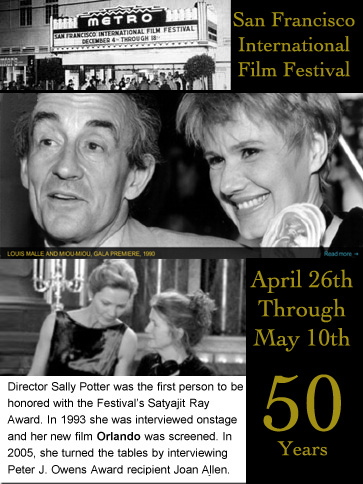Israel Film Festival – Ali Saam interviews producer Eitan Evan, director Shemi Zarhin, and founder of the festival Meir Fenigstein.
 It is a soft and cool evening in Hollywood. I am at the Grauman’s Chinese Theatre to screen a film called “Aviva My Love” from the Israel Film Festival. There is a line of 40 to 50 people waiting to get their tickets and go inside to watch this film.
It is a soft and cool evening in Hollywood. I am at the Grauman’s Chinese Theatre to screen a film called “Aviva My Love” from the Israel Film Festival. There is a line of 40 to 50 people waiting to get their tickets and go inside to watch this film.
I met the founder of the festival, the producer, the director, and the star of this film; and had a chance to interview them and get to know more about the film.
Eitan Evan, the producer –
Ali – Hello, Eitan, and congratulations on the success of the film.
Eitan – Thank you, it is great to be here.
Ali – Where did you shoot the film?
Eitan – The entire film was shot in Israel. 60% of it was shot in Tiberia, and the rest was shot in Tel-Aviv.
Ali – How long did it take to make the film from conception to completion?
Eitan – Six years. However, in the meantime we also worked on another film. Once we finished the last draft, it took one year from shooting to releasing it. We wanted to release it in the summertime, so we waited until July to screen it; but the war between Israel and Lebanon started. However, we went ahead with the screening and the premier in Tiberia in an underground shelter. We got great coverage on TV, which brought us a big audience to see the film. We had the best admittance for this film in Israeli cinema for the past 20 years. It sold over 300,000 tickets.
Ali – Are you planning to release it internationally?
Eitan – Yes, We started with Chicago Film Festival and won the best script. I just came from Berlin Film Festival, where it attracted buyers and we are now in negotiation.
Ali – What was the budget of the film?
Eitan – About $1.2 million, which is a medium size budget for Israeli films. It is probably the size of the catering budget for the American films!!!!! (laughing and joking of course)
Ali – Thank you for the information. I wish you great success.
Eitan – Thank you.
Now I get to speak with Shemi Zarhin, the director and writer of the film.
Ali – Hi, Shemi, how are you?
Shemi – Thank you. Great.
Ali – How long did it take for you to find the cast?
Shemi – It really didn’t take that long because I already knew who I wanted to cast for this project while I was writing it. The main challenge in casting was to find the main character Aviva. It took four months of auditioning so many beautiful and talented actresses before we decided Assy Levy was the right actress for the part.
Ali – What about Assy caught your eyes for this part?
Shemi – Well, on the outside she looks very strong and you would think she will not break because of her strength. So when she feels pain you know it must go deep and you would actually feel her pain when she is going through it.
Ali – How long did it take you to write the script, and what inspired you to write it?
Shemi – I wrote the first draft 8 years ago and it took me 2 or 3 weeks, but I decided to put it aside for a year and do more research. So I rewrote it 14 times. When I submitted it for funding, it took me two to three times before it was accepted for funding.
Ali – How close are the script and the film to the vision you had in mind?
Shemi – It is very close. There are no exacts in art.
Ali – I would like to congratulate you on the film and I wish you luck.
Shemi – Thank you.
Now I finally was able to pull Meir Fenigstein, the founder of the festival, away from everybody so I could interview him and get more information on the festival.
Ali – Hello, Meir. Where are you from and where do you live?
Meir – I am from Tel-Aviv and live in California.
Ali – Have you always been involved in the film industry?
Meir – I used to be a musician in the early 70s. I played in an Israeli rock band called Poogy. It was the biggest rock band in Israel at the time. In 1976 I acted in a couple of Israeli films (“The Troop” and “Aunt Clara”) and I acted in Jerusalem theatre for a year.
Ali – How did you decide to start a film festival?
Meir – I moved to Boston to study music in Berkley College of Music. I then decided to switch from music, and that is when I found a new passion, creating a film festival. I thought this would be a good idea to stay in touch with Israel since I wanted to live in the U.S., and felt by creating a festival I will be in touch with Israel and I can also stay in the entertainment world. This also helped me to sustain my vision and keep it alive. So I did a small festival in Boston. Next, I did one in LA and one in Boston and then one in Chicago. On the 10 th year anniversary of the festival, I realized four cities is too much, so I mainly focused on LA and NY.
I stayed with those two cities for five years until the 15 th year anniversary when I decided I was getting bored with only two cities, so I went ahead and added Miami and Chicago to the list. By the 20 th year I noticed four cities getting to be too much work, so I dropped Chicago. I have been trying to sustain the festival in three cities.
Ali – Do you have a hand in picking the films that are admitted in the festival?
Meir – I have a hand in it but am not the program director. I have two American program directors that pick the films because I am Israeli myself and want this to be more objective. They recommend the films, and we discuss it and make the decision based on the quality of the film, the subject matter. I am happy to tell you this year we have even a greater lineup of films. The best that we have ever had. The films will be running in
After the festival we then move to Miami and then to New York.
Ali – What is your vision for this film festival today and the future?
Meir – The festival should continue in the three cities, bringing more American people to see the films. I am hoping to get the American audiences to come and see Israel through the lenses of the cameras of the Israeli filmmakers and not just the news and the headlines of newspapers and television.
I would also like to mention that one of the films in this festival that is called “Sweet Mud” got the first prize in Sundance film festival and also the winner of the youth category in Berlin Film Festival.
Ali – Are you going to take the festival to other countries?
Meir – Well, I have thought about taking it to some of the English-speaking countries, due to subtitle translation issues.
Ali – Thank you for your time, and I congratulate you on the success of the festival.
Ali Saam
 I am here with Asi Levi, the star of the film “Aviva My Love.” She is a hardworking mother with a great deal of talent and passion for writing stories. Between her job and taking care of her family at home, she still finds time to write.
I am here with Asi Levi, the star of the film “Aviva My Love.” She is a hardworking mother with a great deal of talent and passion for writing stories. Between her job and taking care of her family at home, she still finds time to write.
